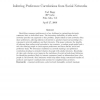Free Online Productivity Tools
i2Speak
i2Symbol
i2OCR
iTex2Img
iWeb2Print
iWeb2Shot
i2Type
iPdf2Split
iPdf2Merge
i2Bopomofo
i2Arabic
i2Style
i2Image
i2PDF
iLatex2Rtf
Sci2ools
ECRA
2010
2010
Inferring preference correlations from social networks
Identifying consumer preferences is a key challenge in customizing electronic commerce sites to individual users. The increasing availability of online social networks provides one approach to this problem: people linked in these networks often share preferences, allowing inference of interest in products based on knowledge of a consumer's network neighbors and their interests. This paper evaluates the benefits of inference from online social networks in two contexts: a random graph model and a web site allowing people to both express preferences and form distinct social and preference links. We determine conditions on network topology and preference correlations leading to extended clusters of people with similar interests. Knowledge of when such clusters occur improves the usefulness of social network-based inference for identifying products likely to interest consumers based on information from a few people in the network. Such estimates could help sellers design customized bu...
| Added | 10 Dec 2010 |
| Updated | 10 Dec 2010 |
| Type | Journal |
| Year | 2010 |
| Where | ECRA |
| Authors | Tad Hogg |
Comments (0)

